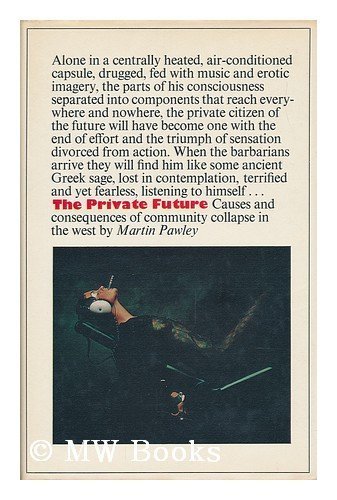In 1973, my friend Martin Pawley published The Private Future: Causes and Consequences of Community Collapse in the West. According to his Guardian obituary (he died in 2008) the book “foresaw a society with ever greater technical means of communication becoming paradoxically more insular and dysfunctional.” Here is an extract (which appeared in full on the jacket of the original hardcover): “Alone in a centrally heated, air-conditioned capsule, drugged, fed with music and erotic imagery, the parts of his consciousness separated into components that reach everywhere and nowhere, the private citizen of the future will become one with the end of effort and the triumph of sensation divorced from action. When the barbarians arrive they will find him like some ancient Greek sage, lost in contemplation, terrified and yet fearless, listening to himself.” The Private Future was written before the internet, iPods, and smart phones. Martin expected a publishing success but the message was too farfetched—and too bleakly dystopian—for the reading public. In our time of social distancing and self-quarantining the book seems more apposite than ever.


I read it, in 1980 — and wondered. It really made me think, which was upsetting — but useful, as were some others.
Yes, he was a very far-sighted observer, of the programmatic alienation, that was then, only being contemplated.
Very convenient, for its designers.
And full of fearfulness, for its ( then, projected ) inmates … ! .
I well remember being struck, by this remarkable prophetic work. How apposite ! He must have had access, to the very best information, then available. It is still, far in advance, of anything similar, but Victor Ferkiss’ Technological Man, of 1969.